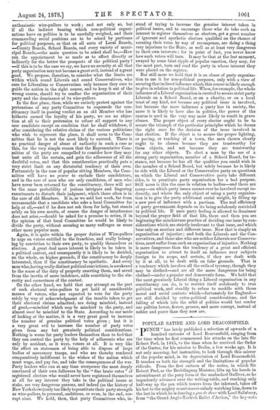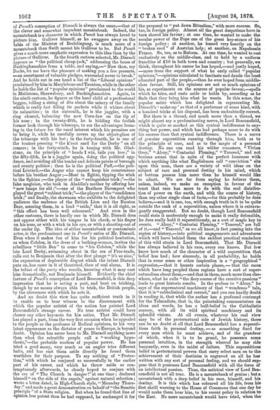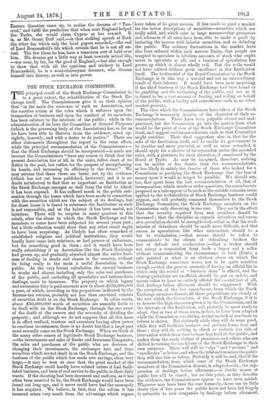POPULAR SATIRE AND LORD BEACONSFIELD.
" pIINCH " has lately published a selection of upwards of a hundred cartoons of Lord Beaconsfield, ranging from the time when he first commenced his attacks on the late Sir Robert Peel, in 1845, to the time when he received the Order of the Garter, for his mission to Berlin, a few weeks ago. It is not only amusing, but instructive, to look through this mirror of the popular mind, in its depreciation of Lord Beaconsfield. It teaches us both the strength and the limitations of popular ridicule. From the first cartoon of the series, in which Sir Robert Peel, as the Brobdingnag Minister, lifts up his hands in astonishment at the puny form of the unabashed Gulliver, as he impudently advances over the writing-table, and reaching only half-way up the pen which towers from the inkstand, takes off his hat to the mighty countenance calmly watching him, down to I the last in which he is dancing apes de deux with Lord Salisbury, ' from "the Grand Anglo-Turkish Ballet d'Action," the key-note of Punch's conception of Disraeli is always the same,—that of the clever and somewhat impudent mountebank. Indeed, the mountebank is a character in which Punch has always loved to picture him. Gulliver himself, as he swaggers away on the table of the Minister of Brobdingnag, is much more of a mountebank than Swift meant his Gulliver to be. But Punch gives a much more emphatic expression to this idea than by the picture of Gulliver. In the fourth cartoon selected, Mr. Disraeli appears as "the political cheap-jack," addressing the boors of Buckinghamshire from a table, and saying,--" Now then, my Bucks, let me have the pleasure of making you a few presents, —an assortment of valuable pledges, warranted never to break." And he holds out in one hand a list of the "Liberal opinions" proclaimed by him in Marylebone and Taunton, while in the other he holds the list of "popular opinions" proclaimed to the world in Maidstone, Shrewsbury, and Buckinghamshire. Again, in the ninth cartoon, he figures as the head child of a professional beggar, telling a string of fibs about the misery of the family which is really fast filling its pockets while it whines about its calamities ; in the sixteenth, he is the juggler, with a ring cleared, balancing the new Corn-law on the tip of his nose ; in the twenty-fifth, he is bidding the foolish farmer look through his telescope, to see the advantages loom- ing in the future for the rural interest which his promises are to bring it, while he carefully covers up the object-glass of the telescope with his hat ; in the forty-fourth, he is one of the touters pressing "the k'rect card for the Derby" on all corners ; in the forty-ninth, he is tossing with Mr. Glad- stone, on the principle of "heads I win, tails you lose ;" in the fifty-fifth, he is a juggler again, doing the political egg- dance, and avoiding all the tender and delicate points of borough and county politics ; then he is the political Puff,—the poli- tical Leotard,—the Augur who cannot keep his countenance before his brother Augur ;—Mose in Egitto, tipping the wink to the Sphinx ;—the player of the "extinguisher trick ;"—the false magician, who took in Aladdin's mother by offering her "new lamps for old ;"—one of the Brothers Davenport who played the great "cabinet trick ;"—the player of the "confidence trick;" and finally, the showman who exhibits to the delighted audience the embrace of the British Lion and the Russian Bear, assuring them, in a loud "aside," that it is all right, as "this effect has been well rehearsed." And even in the other cartoons, there is hardly one ill which Mr. Disraeli does not appear either with his tongue in his cheek, or his finger on his nose, or with a wink in his eye, or with a shooting-out of the under lip. The idea of either mountebank or pantomimic actor, is the predominant one in Punch's satire of Mr. Disraeli. Even when it makes fun of him for his political hesitation, as when Cobden, in the dress of a bathing-woman, invites the rebellious "little Ben" to come to "his Cobden," while the late Lord Derby, swimming about in the sea of Free-trade, calls out to Benjamin that after the first plunge "it's so nice," the expression of deplorable disgust which the infant Disraeli puts on, has more in it of theatrical, than of real alarm. It is the infant of the party who recoils, knowing what it may cost him dramatically, not Benjamin himself. Evidently the chief feature of Punch's conception of Lord Beaconsfield, is this deep impression that he is acting a part, and bent on tricking, though by no means always able to trick, the British people, by the cleverness with which he acts it.
And no doubt this view has quite sufficient truth in it to enable us to bear witness to the discernment with which the popular satirist of the nation has painted Lord Beaconsfield's strange career. No true satirist could have chosen any other key-note for his satire. That Mr. Disraeli has played a part, from the very first occasion when he appealed to the people as the professor of Radical opinions, to his very latest appearance as the dictator of peace to Europe, is beyond doubt. Opinion has never been to Mr. Disraeli anything more than what the scientific people call a "working hypo- thesis,"—the probable nucleus of popular power. He has tried a good many, very much as an angler tries different baits, and has cast them aside directly he found them worthless for their purpose. To say nothing of "Protec- tion," with which he conjured so successfully in the earlier part of his career, and which he threw aside so con- temptuously afterwards, he clearly hoped to conjure with the cry of "The Church in danger r at one time ; declared himself" on the side of the angels," against natural selection ; wrote a letter dated, in High-Church style, " Maunday Thurs- day ;" and made a great demonstration on behalf of "the Semitic principle "of a State religion. But when he found that line of opinion less potent than he had supposed, he exchanged it for the proposal to "put down Ritualism," with more success. Be, too, in foreign policy. Almost all the great despotisms have in turn shared his favour; at one time, he wanted to make the secular power of the Pope one of the great key-stones of his foreign policy ; at another, he leaned very heavily on the "broken reed" of Austrian help ; at another, on Napoleonic- France. So, too, as to Reform. At one time, he wanted to rest exclusively on the middle-class, and to hold by a uniforni franchise of £10 in both town and country ; but generally, we think, throughout his career he has hoped,—and justly hoped, —more from the support of what he early called "popular opinions,"—opinions calculated to fascinate and dazzle the least educated part of the people,—than he ever hoped from middle. class favour. Still, his opinions are not so much opinions of his, as experiments on the sources of popular favour,—spells which he tries, and casts aside or holds by, according as he finds that they bring him what he wants. In this sense, the popular satire which has delighted in representing Mr. Disraeli's 'make-up' as that of a performer of some kind, with a hundred tricks at his disposal, has been undoubtedly correct But there is a thread, and much more than a thread, we might almost say a predominating nerve, in Lord Beaconsfield, which is quite as marked as this cynical indifference to any- thing but power, and which has had perhaps more to do with his success than that cynical indifference. There is a nerve of genuine superstition running through him, both as to the principle of race, and as to the magic of a personal destiny. No one can read his wilder romances, "Vivian Grey," "Ahoy," " Contarini Fleming," " Tancred," and not become aware that in spite of the perfect looseness with which anything like what Englishmen call " conviction " site upon this man, there are a variety of wild ideas on the subject of race and personal destiny in his mind, which at bottom possess him more than he himself would like- to admit. We are far from saying he believes them,. unless, indeed, we make an exception in favour of the tenet that race has more to do with the real distribu- tion of power on the earth, and with the course of history, than any other single class of facts,—for this probably he does believe,—and it is one, too, with enough truth in it to be quite outside the rank of a superstition, unless where it is extrava- gantly exaggerated. But no doubt, though Lord Beaconsfield could state it moderately enough to make it really defensible, he does really hold it superstitiously, as a sort of magic key to events. " Alroy," " Contarini Fleming," " Tancred," are full of it,—and " Tancred," as we all know, is fast passing into the region of history,—into political engagements and adventures which will leave behind them the saddest practical reminders of this wild strain in Lord Beaconsfield. That Mr. Disraeli has always believed in his race, every one knows. But few know how much of the character of a wild superstition that belief has had ; how sincerely, in all probability, he holds that in some sense or other inspiration is a "geographical" expression,—that it haunts certain places,— that the races- which have long peopled those regions have a sort of super.- naturalism about them,—and that in them, much more than else. where, what he calls "the fiery course of the creative passions" leads to great historic results. In the preface to " Alroy," he says of the supernatural machinery of that " wondrous " tale, that it is" cabbalistical and correct," and you can hardly doubt in reading it, that while the author has a profound contempt for the Talmudiste, that is, the painstaking commentators on ideas and words, he has a half-belief in the Cabbalistie sorcery, with all its wild spiritual machinery and its splendid visions. At all events, whatever his real view may be of the preternatural side of Jewish history, there can be no doubt at all that Lord Beaconsfield has a supersti- tious faith in personal destiny, — as something fixed for every man which he must achieve, and of the grandeur of which, when it is to be grand, he possesses some personal intuition, in the strength whereof he may ride buoyantly, even in the midst of failure. This superstitious belief in preternatural powers that carry select men on to the achievement of their destinies is engraved on all he has written with any sort of personal feeling, and we should sup- pose that it possesses Lord Beaconsfield with all the force of an intellectual passion. Thus, the satirical view of Lord Bea- consfield is not all true. He is a mountebank of genius ; but a mountebank with a deep belief in his race, himself, and his destiny. It is this which has coloured all his life, from his first shrill warning to the House of Commons that one day he would make them hear him, to his recent policy in relation to the East. No mere mountebank would have tried, when the Eastern Question came up, to realise the dreams of " Tan- cred," and fulfil the prediction that when next England helped the Turks, she would claim Cyprus as her reward. It is, as Mr. Grant Duff said,—in that striking speech at Bath the other day which only the local papers recorded,—the end of Lord Beaconsfield's life which reveals that he is not all un- real. The few ideas he has, have a tenacious sort of hold over him. His dreams get a little way at least towards actual life, —too near, by far, for the good of England,—but also enough to show that with all the cynicism and trickery in Lord Beaconsfield, he is a semi-clairvoyant dreamer, who dreams himself into history, as well as into power.
































 Previous page
Previous page